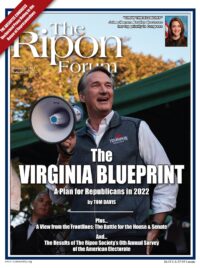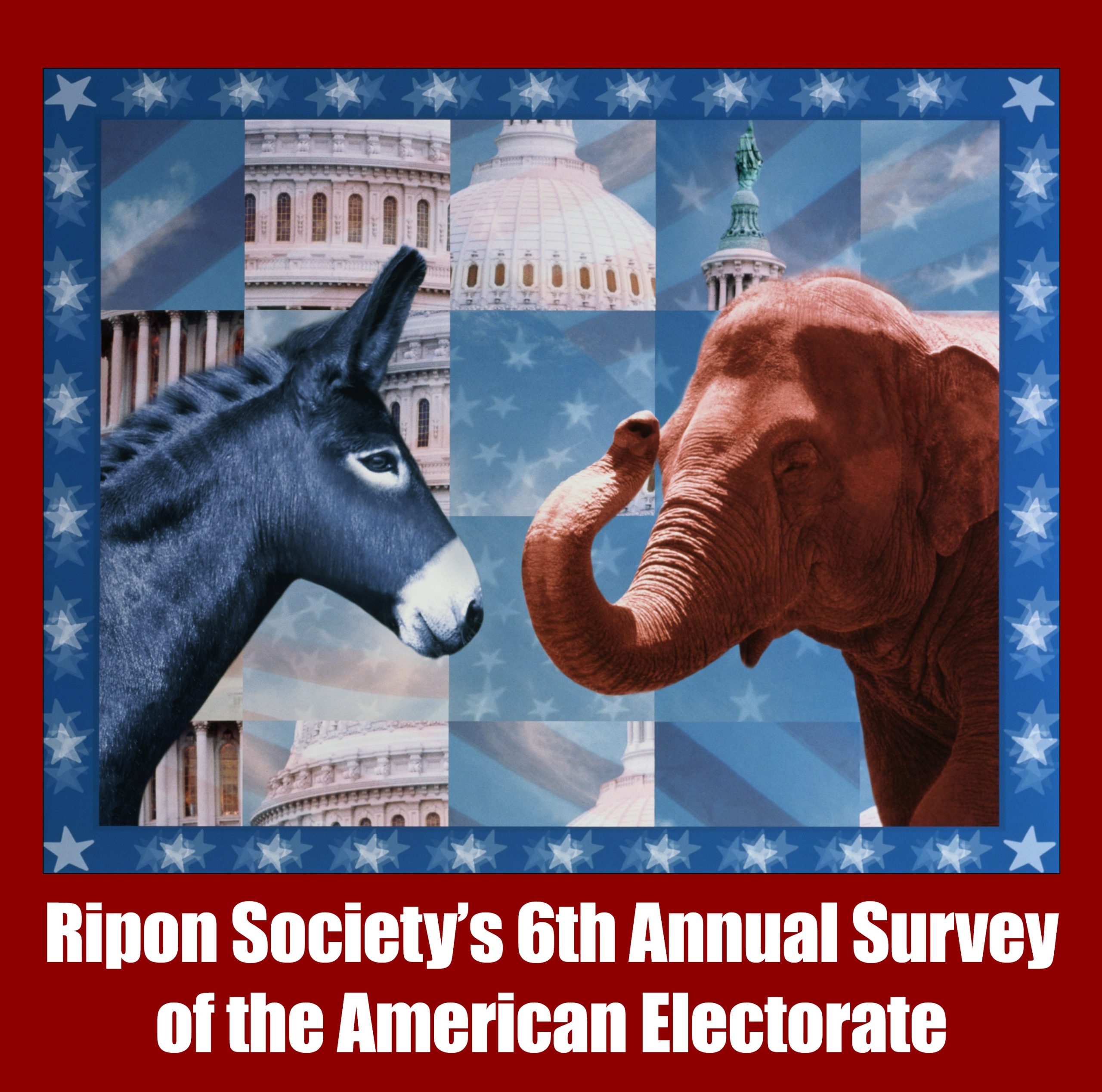
This latest national voter survey for The Ripon Society, conducted among 800 voters from November 13-18, 2021, finds a poor political environment for incumbents, particularly President Biden.
Economic turmoil, social unrest, and the continuing COVID-19 crisis are certainly major contributors to this poor environment. However, these data again make clear that voters are ready to embrace bold solutions and are ready to embrace politicians with the courage to take the lead on pursuing solutions.
In fact, voters in the political center, that is voters who are not very conservative Republicans nor very liberal Democrats compromise fully seventy-two percent (72%) of the electorate. While cable news and online discourse often cater to those voters at the ends of the political spectrum, more than seven-in-ten voters are not at these ends, but rather in the middle. These centrist voters welcome solutions and look warmly upon politicians who pursue them.
The political environment is quite poor. Six-in-ten (60%) voters think the country is on the wrong track, including a majority of voters (52%) who strongly believe this. There is a notable partisan split on this issue with Republicans (94% wrong track) and Independents (70% wrong track) much more negative than Democrats (27% wrong track). However, more than two-in-five moderate to conservative Democrats (42%) think the country is on the wrong track. A majority of the centrist voters (58%) also think the country is on the wrong track.
Voters who are not very conservative Republicans nor very liberal Democrats compromise fully seventy-two percent (72%) of the electorate.
At a basic level, a majority of voters (52%) report that the federal government does not meet the needs of their family. In a trend similar to the direction of the country, majorities of Republicans (76%), Independents (60%), and centrists (50%) say the federal government does not meet the needs of their family. Among Democrats, a majority of liberal Democrats (73%) say they federal government does meet their needs while a majority of moderate to conservative Democrats (50%) say it does not.
A federal government that cannot meet the needs of most of its citizens and one that has the country on the wrong track is in a poor place. In looking at the issue matrix, this situation will be challenging to improve as voters have strong concerns about a variety of issues.
Voters were read a list of 11 issues and asked to rate their importance to them as extremely, very, somewhat, or not at all important. As seen in chart 1, 10 of the 11 issues have a majority of voters indicating it is extremely or very important to them and 9 of the 11 issues have at least one-third of voters saying this issue is extremely important to them. There are times when a singular crisis dominates the issue matrix and political leaders can build goodwill by focusing on that issue. This era is not one of those times. The electorate has diverse interests and a high level of concern about a variety of issues.
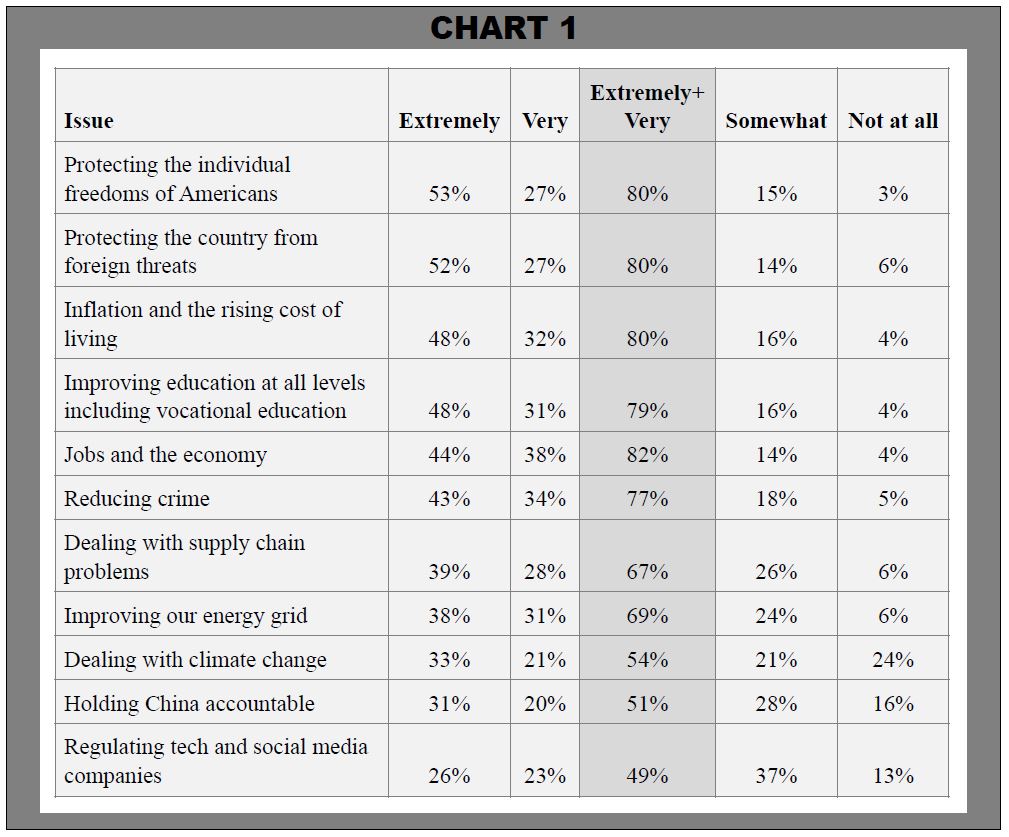
The concerns of centrists mirror the concerns of the overall electorate. A majority of centrists select protecting individual freedoms and protecting the country from foreign threats as issues that are extremely important to them. In addition, the issues of jobs, inflation, crime, and improving education all rank as extremely or very important to at least three-in-four of these centrist voters. Both the overall electorate and the center want to see solutions on a variety of issues. Unfortunately for President Biden, the lack of notable progress on many of these issues is having a negative impact on his job approval ratings.
Centrist voters welcome solutions and look warmly upon politicians who pursue them.
Overall, President Biden has a job approval rating of forty-six percent (46%) approve and forty-nine percent (49%) disapprove. As seen in Chart 2, on the economy, immigration, cost of living, and inflation, President Biden has an approval rating below his overall approval rating and a majority disapproval rating.
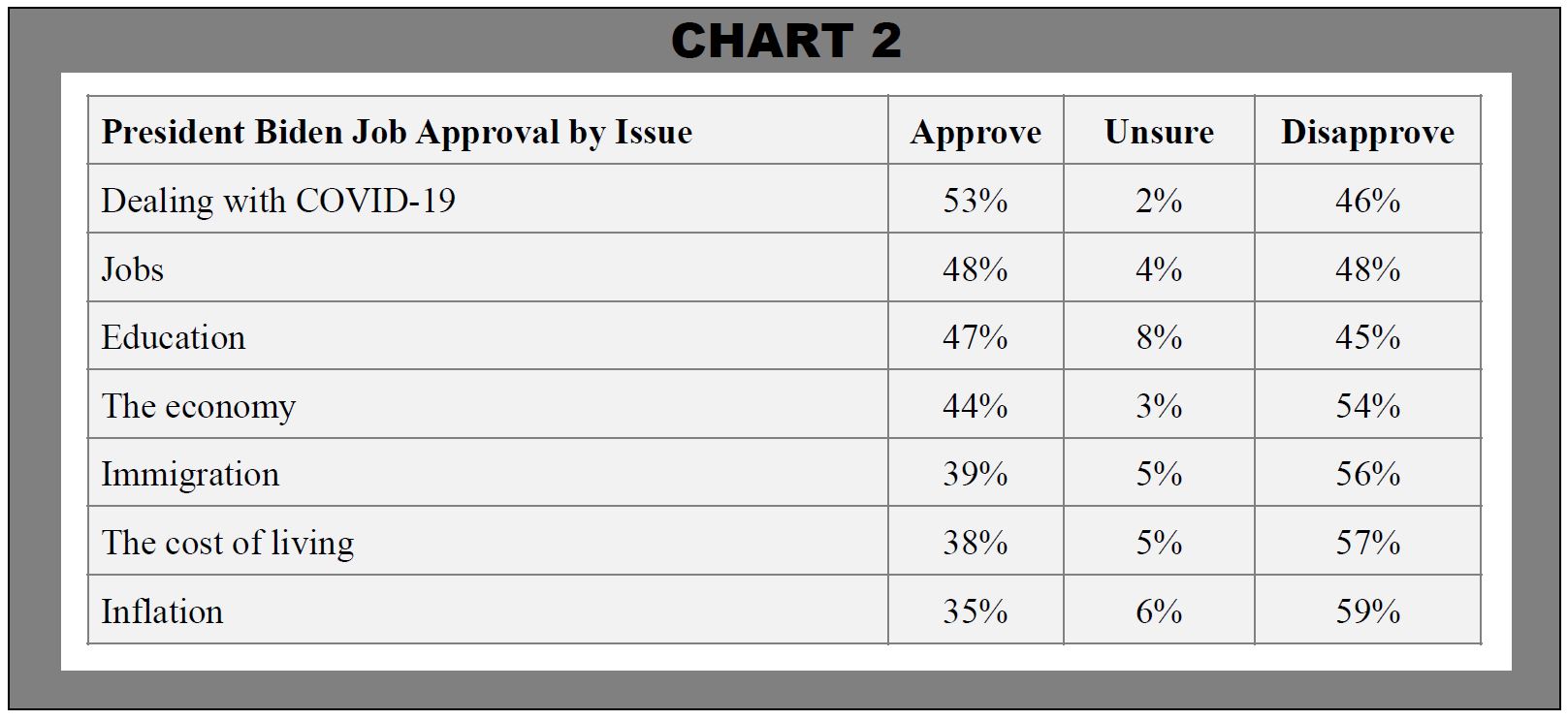
There is a remarkable level of polarization in these assessments. Forty percent (40%) of voters and seventy-eight percent (78%) of Republicans approve of President Biden’s job performance on zero issues. Just under one-quarter (24%) of voters and forty-nine percent (49%) of Democrats approve of President Biden’s job performance on every issue tested.
However, President Biden has notably more goodwill among centrists. They give him a majority approval rating overall (50%) as well as majority approval ratings on jobs (52%) and education (51%). This gives him a strong opportunity to use this goodwill with this significantly sized segment of the electorate to pursue solutions, particularly on the critical issues of jobs and education.
The upcoming elections for control of Congress have a similar dynamic. Republicans have the advantage on most of the issues and on issues likely to be important in the 2022 cycle like the economy, cost of living, jobs, and inflation. However, neither party has the trust of the majority of the electorate on any of these issues.
There was also a similar level of polarization on this measure. Twenty-eight percent (28%) of voters and a majority of Republicans (59%) select the GOP in Congress on every issue. Thirty-one percent (31%) of voters and more than three-in-four Democrats (77%) select the Democrats in Congress on every issue. So, a majority of voters (59%) select one of the parties in Congress on every issue tested.
Republicans have the advantage on most of the issues and on issues likely to be important in the 2022 cycle … However, neither party has the trust of the majority of the electorate on any of these issues.
However, among centrists, Democrats have the advantage on the additional issues of cost of living and jobs along with majority support of education (52%) and dealing with COVID-19 (51%).
Even with a political environment that favors the GOP, this measure demonstrates that Republican candidates will need to make an affirmative case about the merits of their policies. Victory is not assured by party affiliation.
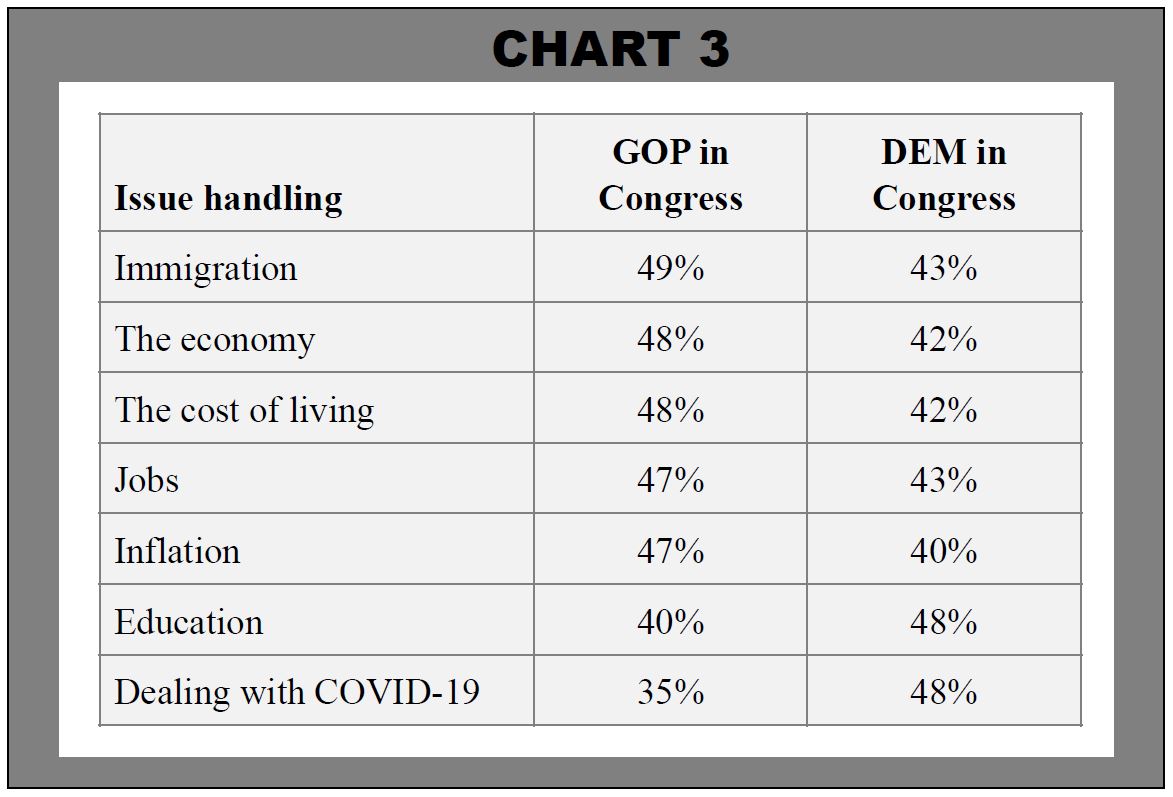
What will endear candidates to voters is being willing to make deals. We presented voters with two options: (1) a politician who consistently fights for my values, even if this means not finding a solution very often, OR (2) a politician who is willing to work together to get things done, even if it means compromising on my values sometimes. A strong majority of voters (69%) selected the politician willing to work together. This includes majorities of crucial voting blocs like seniors (70%), African Americans (74%), Independents (58%), Democrats (83%), and centrists (69%). Even demographic groups where one might expect more support for fighting consistently for values like partisan Republicans (45%), evangelicals (54%), and those who use cable TV as a top news source (71%) all select the dealmaker-oriented politician at a notable level. Voters across the political, ideological, and cultural spectrum prefer politicians who are willing to work to get things done.
The policy landscape is fertile with proposals that garner strong majority support among both the overall electorate and centrists.
As seen in Chart 4, the policy landscape is fertile with proposals that garner strong majority support among both the overall electorate and centrists. Indeed, every one of the proposals tested had majority support and seven of them have the support of at least two-thirds of the electorate. Politically viable policy solutions on issues ranging from better coverage for mental health services to tax reform are available. They just need bold and courageous politicians willing to work on them.
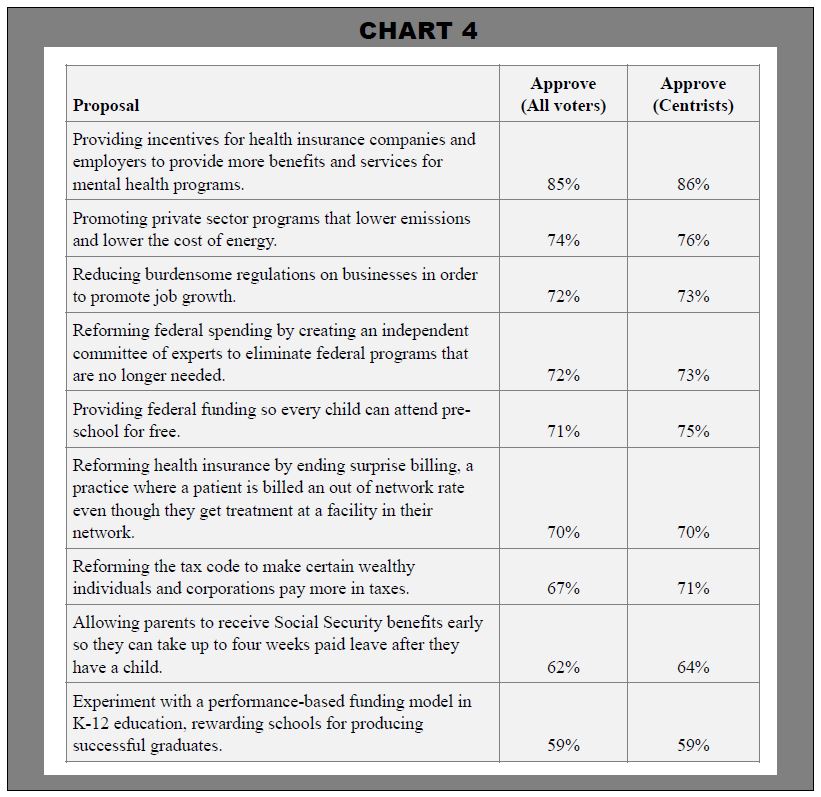
In addition, the expanded child tax credit tested well. After a brief description about the $300 per month per child benefit, a majority of voters (54%) and a majority of centrists (58%) support these payments. This level of support is remarkable given that only twenty-nine percent (29%) of voters indicate they have a child at home and would qualify for this benefit. A majority of non-parents (55%) support these payments. A broad coalition of voters supports providing some assistance to parents.
Voters do strongly support a work requirement for this benefit. Fully seventy-five percent (75%) of voters and seventy-nine percent (79%) of centrists support adding a work requirement to this benefit, so that the parent must be working or a stay at home parent caregiver. This series of questions is an excellent illustration of a policy solution that should garner strong support – needed assistance for parents, but with safeguards to ensure this money is not just a handout that discourages working.
Throughout this data, we found that despite a political environment in which voters are clearly frustrated and concerned, there are a variety of ways political leaders at all levels could be the type of deal making leaders that most voters want. Most of the popular solutions in this study are not from either ideological extreme. Instead, they are reasonable solutions to challenging issues like treating mental health, limiting pollution, reducing the meddling power of the federal government, limiting health care costs, and providing a budget friendly solution for paid parental leave.
Voters are ready for solutions and they are clearly frustrated by the lack of achievements by the Biden administration and the Democratic controlled Congress. This frustration provides a strategic opening for Republican candidates across the country.
However, these GOP candidates cannot simply be against Biden and his Congressional allies. These GOP candidates need to be for solutions, particularly well-received ones. It is not enough to be the party of “no”; Republicans need to be the party that can pivot the country to pursuing popular solutions that benefit so many. Wins will need to be earned by offering better solutions.
Ed Goeas is President & CEO and Brian Nienaber is a Vice President at The Tarrance Group.



